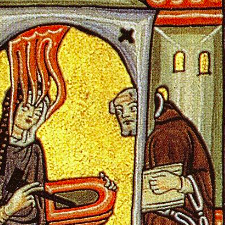The Brain, a User's Manual:
How to Talk About Things—Part Two

By Gabriel Blanchard
Having armed ourselves with substance, let's have some accidents.
To resume! Last time, we spoke about the category of substance, and the complexity (and simplicity) that can go with it. We now pass to the other categories listed by Aristotle.
Quantity
First we have quantity. This is not, as one might assume, about “how many” of a given substance there are (because remember, in the Aristotelian scheme, a substance is an individual thing—it’s different in that way from a Platonic Form, which is reflected in multiple objects). Instead, quantity is about the size of a thing, and also whether it is continuous or discrete, i.e. whether it appears as a single mass or is divided into separated parts. (For instance, from the perspective of someone above ground,* a subway system is a thing with discrete parts, because all you can see from there are the station entrances. In fact, the subway system must be continuous, because if it’s not the trains will fall into the gaps.)
Quality
Next, quality. This covers most of the adjectives you can apply to a substance, at least when you’re thinking of it by itself (a few more adjectives come in if we put the substance into a context, which is what the next few categories are for). “Hot,” “blue,” “silent,” “knobbly,” and “bitter” are examples of qualities.
Interlude: Two Notes on Vocabulary
In the philosophy of the High and Late Middle Ages, which was conducted mostly in Latin, some (not all) qualities were referred to as “accidents.” This was because that term comes from the Latin accidere, meaning “to happen, befall”—in other words, these qualities “just happened to be the case,” as opposed to being of the nature of the substance in question: a red car really is red, but that’s because it was painted red. It could be painted some other color without changing its car-ness. This sense of “accident” is still used by some writers, especially in Catholic circles; it’s also where we get the musical meaning of the word “accidental.”
In the more snobbish sorts of philosophy book, you’ll sometimes see references to a thing’s quanta or qualia. These are just fancy-dress words for its quantities and qualities, in the senses explained above.
"Just exercise your devastating talent for keeping to the point and speaking the truth."
"That sounds easy."
"It is—for you. That's what I love you for ..."Dorothy L. Sayers, Gaudy Night, ch. XVII
Relation
This is a bit of an oddity. Basically, it defines the substance you’re talking about in terms of some other substance: being twice as heavy as something, for instance, or the sister of someone.
Place and Time
Relativity (not to be confused with relation!) notwithstanding, place and time are fairly self-explanatory—something is up there, or in the fire, or too late.
Posture
The name for this one is a bit tricky to translate in a way that makes its meaning clear; “relative position” is another rendering (just don’t confuse it with relation or place). The examples Aristotle gives are “lying down,” “sitting,” and “standing”—posture in a pretty literal sense.
Condition
This one can also be translated “state.” It means the, uh, state or condition something is in (how the object is rather than what it is, so to speak). Normally this is the result of some action: “clothed,” for example, or “broken.”
Action
This is another straightforward one: it’s what a substance does, to something else or to itself.**
Affection
This is the “passive” counterpart to the last one. “Affected-ness” would have been a (clunky) alternative; “passion” used to be the standard English equivalent, before that word came primarily to mean “strong emotion.”† For the category of affection, Aristotle offered the slightly alarming but admittedly serviceable examples “to be lanced” and “to be cauterized.”
And those are all of Aristotle’s basic categories! We have one more topic to glance over, which is the many ways in which things can be opposites of one another. We’ll tackle that next time.
*For the purposes of this example, they need not be specified except to say they are not Superman.
**Self-censoring ideas act on themselves, for example. If there are any.
†Before that semantic shift took place, “passion” usually meant “suffering” (which it now retains only in set phrases like “Christ’s Passion”), and before that, something more like “undergoing, experiencing.” It was thus more obviously aligned with “passive,” to which it is related; both ultimately go back to the Latin patī, “to endure,” which likewise lies behind “patient” and “perpetual.”
Gabriel Blanchard is a spatially and temporally continuous mass who serves as CLT’s editor at large. He lives in Baltimore, MD.
Happy Halloween! If you enjoyed this piece, you might also enjoy one of our “Great Conversation” essays—try our posts on fate, good and evil, imagination, magic, and signs and symbols; and thank you for reading the Journal.
Published on 31st October, 2024.